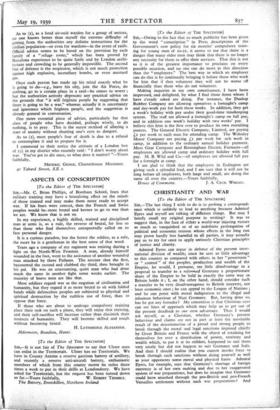[To the Editor of THE SPECTATOR]
SIR,—Owing to the fact that so much publicity has been given to the word " conscription " in Press descriptions of the Government's new policy for six months' compulsory train- ing for young men of 20-21, it seems to me that there is a danger that many older men may think that there is no longer any necessity for them to offer their services. That this is not so it is of the greatest importance to proclaim on every possible occasion, and no one can do more in this direction than the "employers." The best way in which an employer can do this is by continually bringing it before those who work for him that if they volunteer they will not be worse off financially than those who do not volunteer.
Making inquiries in my own constituency, I have been impressed, and delighted, by what I find those firms whom I have already asked are doing. For instance, the Dunlop Rubber Company are allowing operatives a fortnight's camp and day-work pay for both these weeks. In addition, they get a week's holiday with pay under their good-time timekeeping system. The staff are allowed a fortnight's camp on full pay, and in addition one week's holiday with two weeks' pay. I believe this firm is the first ever to produce its own recruiting posters. The General Electric Company, Limited, are paying LI per week to each man for attending camp. The Wolseley Motor Company are paying LI per week for :.ach week in camp, in addition to the ordinary annual holiday payment. Moss Gear Company and Birmingham Electric Furnaces—all employees are allowed camp and ordinary holiday with full pay. M. B. Wild and Co.—all employees are allowed full pay for a fortnight at camp.
I am glad to think that the employers in Erdington are giving such a splendid lead, and I am sure that it will not be long before all employers, both large and small, are doing the same all over the country.—Yours faithfully,


















































 Previous page
Previous page